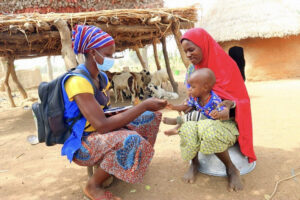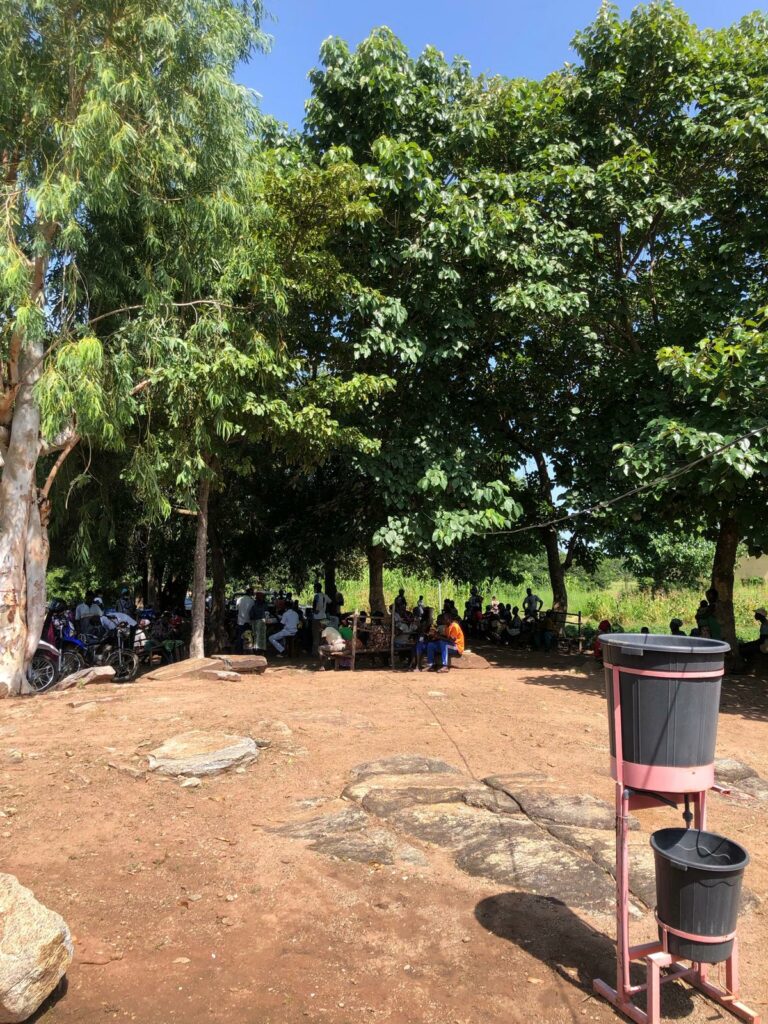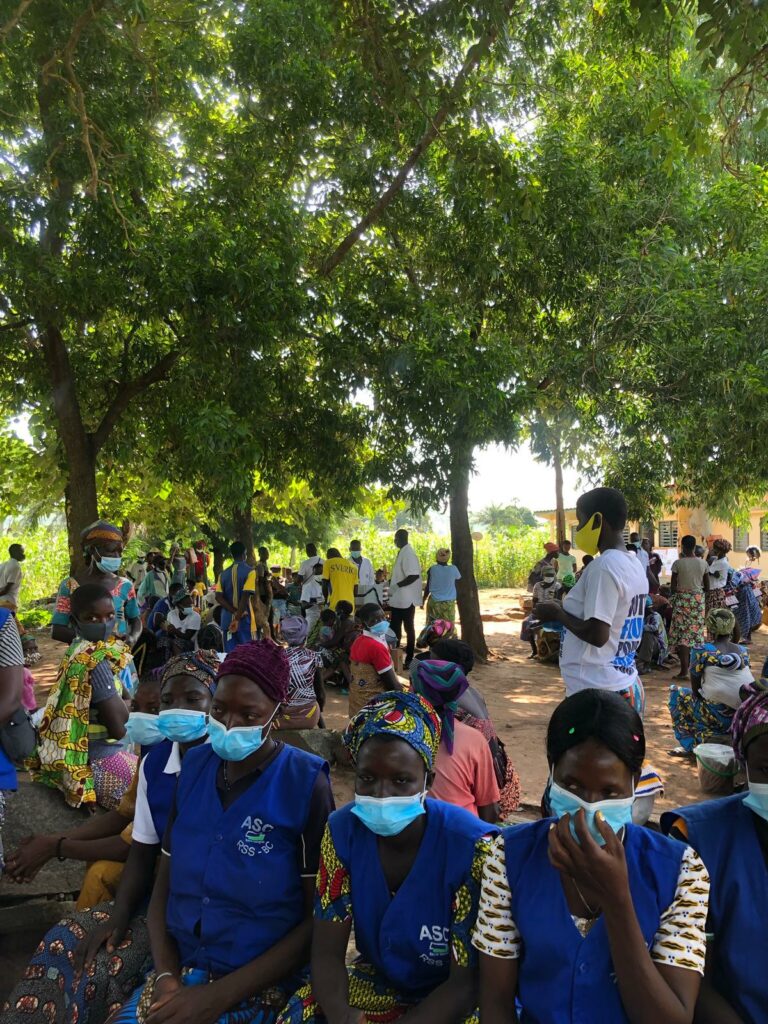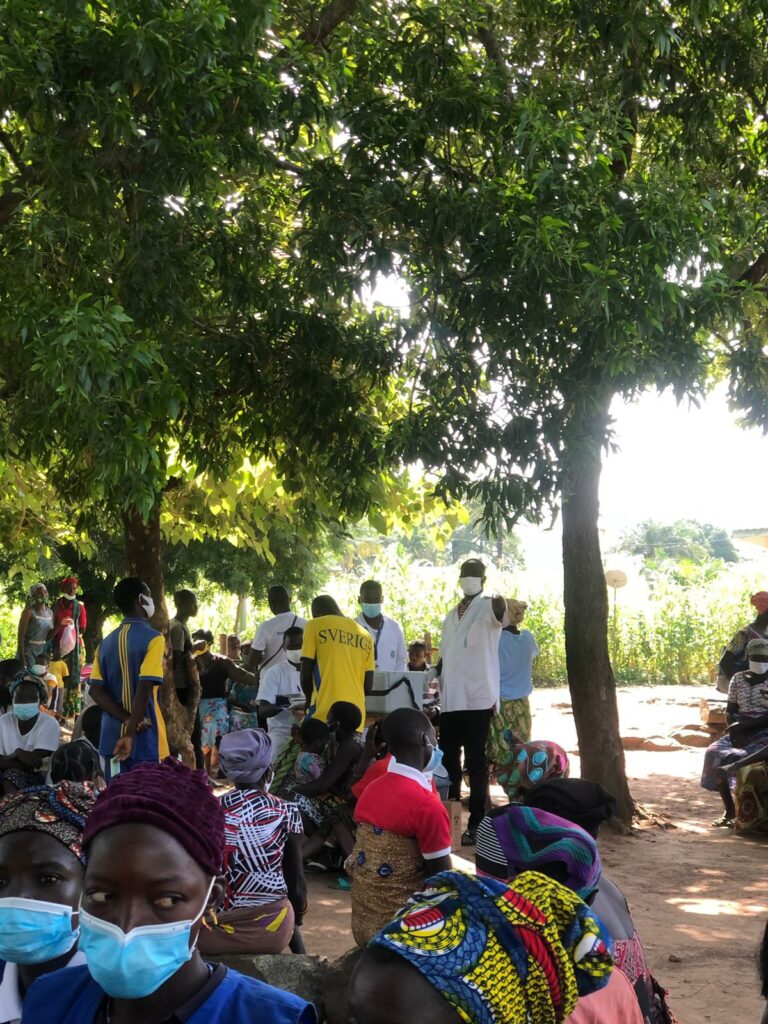Unveiling the truth about the COVID-19 response in African countries: the case of Togo
As I was driving up to the health center during a recent visit in northern Togo, I saw a crowd of people gathered under the trees. Dozens of men, women, and children were sitting on benches or rocks, patiently waiting. I was intrigued and had to ask what was happening. Integrate Health Program Director, Emile Bobozi, told me it was a vaccine distribution and that people from neighboring communities were waiting to receive their COVID-19 shot. I have been consistently impressed with the Government of Togo’s proactive response to the COVID-19 pandemic. Yet, I was genuinely surprised to see vaccination being rolled out in a rural area such as Péssaré.
Listening to the news recently, I heard a report that opened with this headline: “65% of the population of rich countries are vaccinated, while in poor countries this number is only 3%.” Walking into a vaccination campaign underway in a remote, rural village in northern Togo was thus unexpected. This experience made me realize that the global news coverage certainly does not reflect the massive effort underway in many countries. In Togo, the government has deployed every means at its disposal to vaccinate their populations as quickly as possible, overcoming critical gaps and challenges magnified by global inequities.
Early government response to the COVID-19 pandemic
From the very beginning of the pandemic, Togo realized the gravity of the situation and how dangerous the virus was for its population. The first case of COVID-19 in Togo was reported on March 6th, 2020. Local authorities soon implemented a series of measures, including partial lockdowns in urban areas to slow the spread of the disease. Meanwhile, the national government, through the Ministry of Health, focused on expanding medical infrastructure and providing laboratory equipment and logistical support. Weekly task force meetings were organized to share information with partners and to facilitate decision-making. Partners were further solicited to organize, implement, and monitor effective interventions in response to the pandemic. Integrate Health was one of the organizations to respond to the call by raising more than $900,000 USD to provide supplies and improve infrastructure in the fight against COVID-19.
In total, 80 days passed between when a health worker in the United States received the first dose of a COVID-19 vaccine and when shipments of the vaccine began to arrive on the continent in Africa. During this time, Togo was preparing to support the vaccine roll-out campaign. By September 2021, close to 70 vaccination centers had been set up to help meet the government target of providing 4.8 million doses to the Togolese population. As of December 25th, the number of fully vaccinated people was almost reaching the one-million mark (according to data communicated by Togo’s Ministry of Health and the World Health Organization in the COVID-19 Situation Report, dated December 25th, 2021).
As the government of Togo pushed for vaccines and equipment to be deployed and supplied to the population at an early stage, Togo became a regional leader in terms of vaccine roll-out. While challenges remain to meet the objective of vaccinating 95% of the target population, the government’s response is still far from what global news outlets portray in African countries. In fact, in addition to the efforts we just mentioned, Togo has also been fighting misinformation about negative effects of the vaccine. The government has been mobilizing actors (prefects, mayors, village chiefs, civil society organizations, and religious and community leaders) to that effect. Among them, Community Health Workers have played a critical role.
Community Health Workers driving the demand for vaccines by combatting misinformation
Throughout the COVID-19 pandemic, the government, as well as Integrate Health-supported Community Health Workers, have been spreading prevention information to their patients and communities. As trusted members of their community, Community Health Workers have been playing a myriad of roles. Since they continued to visit patients directly in their homes, they have been able to address concerns and provide support for families struggling to deal with the pandemic. By providing information about the safety of the vaccine, Community Health Workers have also contributed to increasing demand while tracking vaccine coverage and following up on the adverse effects.
To further support the government and Community Health Workers in the fight against COVID-19, Integrate Health has also been preparing Community Health Workers by providing them with information about the vaccine. The objective is to better equip Community Health Workers to prepare communities to accept the vaccine as it is still being rolled out.

Atoume Atampa, a Community Health Worker in the Kéran district, recalls what happened when the vaccine first became available in Togo. She heard rumors spreading in her community about various side effects, and many people did not want to be vaccinated. Atoume decided to lead by example and received her vaccine in March. While smiling, Atoume noted that after receiving the vaccine, community members wanted to see if she had side effects. She proudly told them no. As a trusted professional in her community, Atoume spreads facts and dispels myths and rumors about the COVID-19 vaccine. By relaying information between the health center and the community, Community Health Workers have played a critical role in ensuring that their neighbors are protected by the vaccine.
Maintaining continuity of care throughout the pandemic
While the COVID-19 pandemic intensified around the world, Community Health Workers have not only been a critical source of information, but they have also continued delivering lifesaving care to their patients without interruption. To ensure the safety of Community Health Workers and to and make sure they could continue visiting patients to their homes, the Government of Togo vaccinated 90% of heath workers, including 100% of Integrate Health-supported Community Health Workers. But even before the vaccine became available, Togo moved quickly to equip them with personal protective equipment to make sure they could maintain their presence in the community.
According to CAF Africa, Togo was one of the 12 countries that responded to the first call for PPE deployment, carried out between June and July 2020. The first round secured a six-month supply of PPE, with over two million masks ordered. To further support those efforts, Integrate Health acted quickly to ensure that all Community Health Workers and health center staff had the additional PPE required to do their job. To overcome shortages of equipment, Integrate Health also partnered with a local Togolese start-up, Eco TechLab, to facilitate procurement.
Continuity of care has been a major concern for the government and, as a close partner, Integrate Health has supported the response throughout. As a result, government data as well as Integrate Health programmatic data have shown no signs of drop-off of primary care during the pandemic.
Conclusion
Togo’s response to COVID-19 has not only been prompt, but has also involved a variety of stakeholders, from community members to implementing partners. With this approach, steady progress has been made. And Integrate Health, as an NGO with a long-standing relationship with the government, has provided critical support. Our organization has participated in weekly COVID-19 meetings and engaged the government in building infrastructure such as isolation clinics to support the response. Additionally, Integrate Health-supported Community Health Workers have led by example in showing our partners how effective Community Health Workers are in maintaining delivery of health services despite the crisis. This has significantly strengthened our relationship with the government, which now sees us as a key partner in the response, even going so far as to say that they would like to engage Integrate Health-supported Community Health Workers in vaccine distribution efforts. Showing up and responding builds relationships.
This is what has been done in Togo. And although it has not made the headlines of global news outlets, the efforts and efficiency of a multi-stakeholder approach to the COVID-19 response should not be overlooked. To be able to see the positive outcomes happening in countries like Togo, we sometimes need to look beyond the information that we passively consume and self-reflect on the way we seek and process that information.



